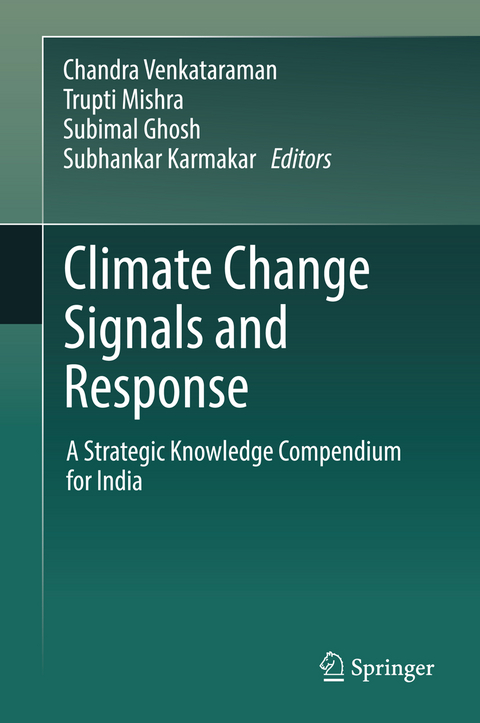
Climate Change Signals and Response
Springer Verlag, Singapore
978-981-13-0279-4 (ISBN)
The book presents a concise interpretation, distilling practical recommendations and policy prescriptions at national and sub-national levels. It serves as a reference point for understanding scientific advances and persisting uncertainty, future vulnerability and response capacity of interlinked human and natural systems, pertaining to India. It is an excellent resource for policy makers and industry watchers in addition to the research fraternity.
Chandra Venkataraman is a Professor of Chemical Engineering and Associate Faculty at the Interdisciplinary Programme in Climate Studies, IIT Bombay. She works on environmental and climate science and aerosol nanoparticle engineering. Her research has contributed influential scientific knowledge on black carbon aerosols, climate change and air quality degradation over South Asia. She has built research networks for climate and air quality studies. She is the National Coordinator of the NCAP-COALESCE project leading 17 institutions investigating regional climate impacts of carbonaceous aerosols (MoEFCC). At IIT Bombay, she was instrumental in the establishment of Interdisciplinary Programme in Climate Studies and was Principal Investigator of the DST-supported Centre of Excellence in Climate Studies. She is the recipient of a Fulbright-Nehru Research Fellowship (2012), Vikram Sarabhai Award (2005), Fellowship of the Indian National Academy of Engineering (2016), the National Academy of Science, India (2017), and the Indian Academy of Science (2017). Trupti Mishra is an Associate Professor at Shailesh J. Mehta School of Management and Associate Faculty at Interdisciplinary Programme in Climate Studies, IIT Bombay. She holds a Ph.D. in Economics from IIT Kharagpur. Her research interest is focused on economics of pollution, economic assessment of climate change vulnerability, adaptation and mitigation options and corporate environmental sustainability. Her research involves developing different low carbon scenario in sectors, identifying cost-effective mitigation option for industry, suggesting environmental compliances measures to achieve low carbon growth. She has published her research findings in various chapters and journal papers. She is also working on climate change impact and adaptation at city and community level. Her co-authored 2017 publication in Climate and Development (Taylor & Francis) on assessing the socio-economic vulnerability of cities in India received wide mainstream media coverage. Subimal Ghosh is an Associate Professor at the Interdisciplinary Programme in Climate Studies and a Faculty at the Department of Civil Engineering, IIT Bombay. He works in the area of hydro-meteorology. His research interests include climate change impact assessment with statistical downscaling, understanding land surface feedback to monsoon, hydrological simulation and urban extreme rainfall forecasts. He has received several awards in recognition of his research, a few among them being INAE Young Engineer Award, INSA Young Scientist Award, NASI Young Scientist Award and IEI Young Engineer Award. He has published articles in reputed journals such as Nature Climate Change, Nature Communications, Scientific Reports,Geophysical Research Letters, Journal of Climate, Water Resources Research. He has been selected as one of the lead authors for IPCC Assessment Report 6 for a chapter on extremes by Working Group-I. Subhankar Karmakar is an Associate Professor at the Centre for Environmental Science and Engineering, and an associated faculty member at the Interdisciplinary Programme in Climate Studies, IIT Bombay. He obtained his Ph.D. on “Uncertainty Modelling in Water Resources Systems” from the Indian Institute of Science, Bangalore, India, and was a Postdoctoral Fellow at the University of Western Ontario, Canada. Further, he received a BOYSCAST Fellowship from the Government of India to pursue research on Ecological Modelling at Duke University, NorthCarolina, USA. His primary research interests are environmental systems analysis, uncertainty modelling and risk vulnerability analysis to climate-induced natural hazards. Some of his recent research contributions include understanding the dependence of Indian summer monsoon rainfall extremes on temperature, mapping disaster vulnerability for a densely populated coastal urban area, and developing lifecycle-based decision support tools for selecting wastewater treatment alternatives. He has published over 40 international journal papers, 5 chapters and several international conference proceedings.
Section I: Regional Climate Change Signals.- 1. Land surface feedback and impacts of land use change to Indian Monsoon Rainfall.- 2. Intraseasonal short-term suppression of monsoon by aerosols.- 3. Future hydrologic scenarios in India under climate change.- 4. Links between global climate teleconnections and Indian monsoon rainfall.- 5. Urbanisation and Surface Urban Heat Island Intensity (SUHII).- 6. Future Heat Wave Projections and Impacts.- 7. Decadal GMB Estimations for Glaciers in Western Himalayas.- 8. Atmosphere and ocean mixing processes.- 9. Nearshore Sediment Transport in a Changing Climate.- Section II: National and Sub-national Responses to Climate Change.- 10. A comprehensive social vulnerability analysis at a national scale.- 11. Review of energy-economics modelling for India.- 12. Sectoral energy intensity and climate impact.- 13. Scenarios of SLCP emissions and mitigation pathways to 2050.- 14. Drivers of climate change adaptation and measurement of adaptive capacity.- 15. Carbon Mitigation Potential of Alternative Bioenergy Pathways.- 16. Cross sectional institutional linkages in climate change responses.- 17. Present day emissions and low carbon growth pathways for the brick sector.- 18. Consumer response to policy interventions in energy efficiency: Climate policy implication.
| Erscheinungsdatum | 21.09.2018 |
|---|---|
| Zusatzinfo | 63 Illustrations, color; 7 Illustrations, black and white; XXX, 303 p. 70 illus., 63 illus. in color. |
| Verlagsort | Singapore |
| Sprache | englisch |
| Maße | 155 x 235 mm |
| Themenwelt | Naturwissenschaften ► Biologie ► Ökologie / Naturschutz |
| Naturwissenschaften ► Geowissenschaften ► Meteorologie / Klimatologie | |
| Wirtschaft ► Volkswirtschaftslehre | |
| ISBN-10 | 981-13-0279-0 / 9811302790 |
| ISBN-13 | 978-981-13-0279-4 / 9789811302794 |
| Zustand | Neuware |
| Haben Sie eine Frage zum Produkt? |
aus dem Bereich


